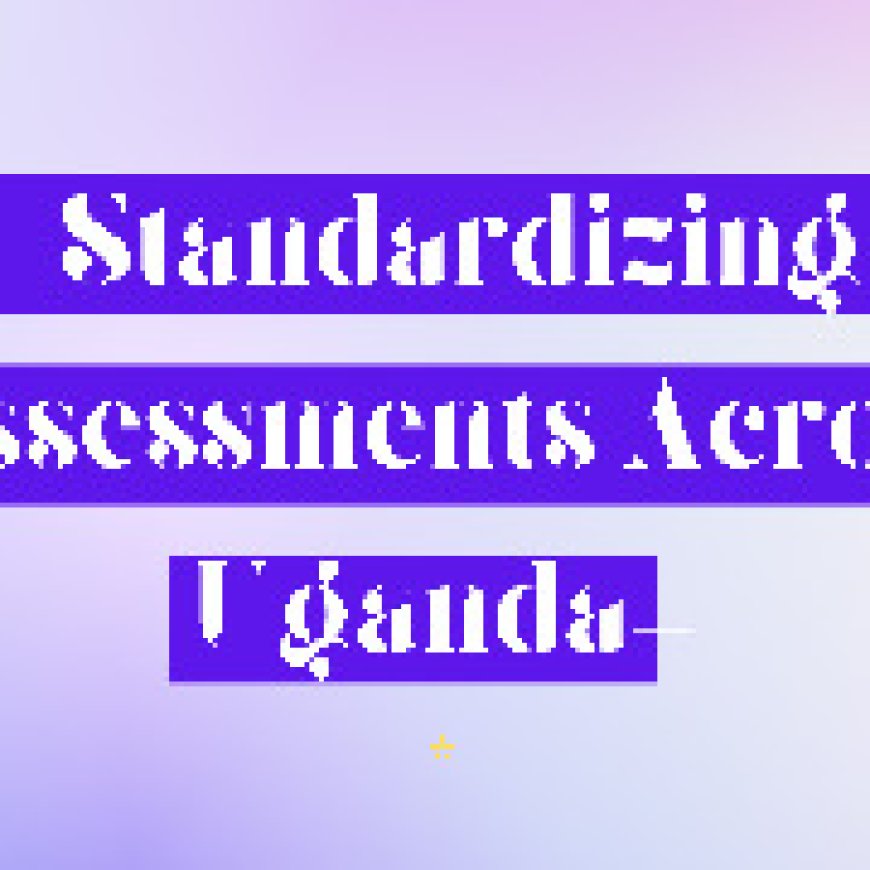The Challenges of Standardizing Assessments Across Uganda

Standardizing assessments in Uganda remains a significant challenge within the country's educational framework, impacting both equity and quality in student evaluation. Despite having national examinations like the Primary Leaving Examination (PLE) and the Uganda Certificate of Education (UCE), inconsistencies persist, making it difficult to fairly evaluate student performance. While initiatives such as Universal Primary Education (UPE) and Universal Secondary Education (USE) have improved access, systemic challenges linked to historical, cultural, and socioeconomic factors continue to hinder the effectiveness of standardized assessments.
Key Challenges in Standardizing Assessments
1. Regional Disparities
Educational outcomes vary significantly between urban and rural areas and between private and public institutions. Students in rural settings often face disadvantages due to limited access to quality resources, trained teachers, and well-equipped schools.
2. Cultural and Socioeconomic Bias
Standardized tests often favor students from more privileged backgrounds who have access to private tutoring and quality educational materials. Non-native English speakers and students from lower-income families are at a disadvantage, leading to an uneven playing field.
3. High-Stakes Examinations
The heavy emphasis on national examinations creates immense pressure on students and educators. This system encourages rote learning over critical thinking and holistic education, prompting calls for a shift towards continuous assessments.
4. Inconsistent Accountability
Regulatory frameworks struggle to enforce uniform quality standards across all institutions. Variations in compliance between public and private schools contribute to disparities in educational quality and assessment outcomes.
5. Gender Disparities
Historically, gender biases have affected educational access and performance, particularly for girls from marginalized communities. Addressing these disparities requires targeted policies to ensure equal opportunities for all learners.
Historical Context of Uganda’s Assessment System
Uganda’s assessment framework has evolved through various reforms. Since the colonial era, education policies have aimed to improve quality and access. Key reforms include:
- Universal Primary Education (1997): Led to increased enrollment but also overcrowded classrooms and a decline in quality.
- Universal Secondary Education (2007): Expanded access but faced challenges in implementation, including teacher shortages and inadequate resources.
- Multiple Examination Formats: PLE, UCE, and other assessments create a complex system that sometimes lacks coherence and standardization.
- Cultural Responsiveness Issues: Assessment practices often fail to consider linguistic and cultural diversity, leading to biases in student evaluations.
Current Assessment Framework
Uganda employs various national examinations, including:
- Primary Leaving Examination (PLE)
- Uganda Certificate of Education (UCE)
- National Assessment of Progress in Education (NAPE)
- Practice Examinations
Objectives of the Current System:
- Enhance student learning
- Inform instructional practices
- Support data-driven policy decisions
Key Challenges:
- Perceived as high-stakes, creating stress for students
- Calls for continuous assessment models instead of reliance on final exams
Proposed Enhancements to Uganda’s Assessment System
1. Clear and Transparent Standards
Establishing well-defined standards for assessment processes, transparency in reporting, and a culture of continuous improvement rather than blame.
2. Shift to Continuous Assessment
Transitioning from high-stakes exams to class-based, formative assessments that reflect students’ progress over time.
3. Addressing Regional Disparities
Implementing targeted interventions to ensure equitable educational opportunities across all regions.
4. Reducing Socioeconomic and Cultural Bias
Integrating culturally responsive assessment methods to cater to diverse student backgrounds.
5. Strengthening Accountability
Enhancing monitoring and review mechanisms to ensure consistent enforcement of quality standards across educational institutions.
Future Prospects
1. Digital and AI-Driven Assessments
Integrating technology into the assessment process to modernize learning and evaluation methods.
2. Performance-Based Assessments
Shifting towards evaluating practical knowledge application instead of rote memorization, promoting teamwork and problem-solving skills.
3. Strengthening Educational Regulations
Developing clearer guidelines for teacher training, school management, and compliance monitoring to ensure quality education for all students.
Conclusion
Standardizing assessments in Uganda requires addressing systemic disparities, embracing continuous assessments, and improving accountability mechanisms. By implementing strategic reforms and leveraging technology, Uganda can create a fair and inclusive assessment system that accurately reflects students' abilities and potential.









































